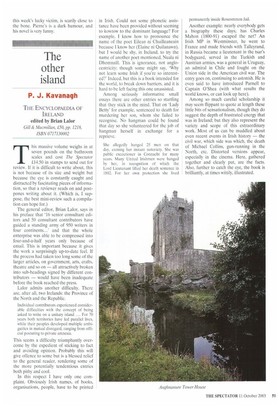The other island
P. J. Kavanagh
THE ENCYCLOPAEDIA OF IRELAND edited by Brian Lalor Gill & Macmillan, 1150, pp. 1218, ISBN 0717130002 This massive volume weighs in at seven pounds on the bathroom scales and cost The Spectator £14.50 in stamps to send out for review, If it is difficult to write about, this is not because of its size and weight but because the eye is constantly caught and distracted by fascinating pieces of information, so that a reviewer reads on and postpones writing about it. (Which is, I suppose, the best mini-review such a compilation can hope for.)
The general editor, Brian Lalor, says in his preface that '16 senior consultant editors and 50 consultant contributors have guided a standing army of 950 writers in four continents...' and that the whole enterprise was able to be compressed into four-and-a-half years only because of email. This is important because it gives the work a surprisingly up-to-date feel, If the process had taken too long some of the larger articles, on government, arts, crafts, theatre and so on — all attractively broken into sub-headings signed by different contributors — would have been inadequate before the book reached the press.
Lalor admits another difficulty. There are, after all, two Irelands: the Province of the North and the Republic.
Individual contributors experienced considerable difficulties with the concept of being asked to write on a unitary island .... For 70 years both territories have led parallel lives, while their peoples developed multiple ambiguities in mutual disregard, ranging from official posturing to private amnesia.
This seems a difficulty triumphantly overcome by the expedient of sticking to fact and avoiding opinion. Probably this will give offence to some but is a blessed relief to the general reader, rendering some of the more potentially tendentious entries both pithy and cool.
In this respect I have only one complaint. Obviously Irish names, of books, organisations, people, have to be printed
in Irish. Could not some phonetic assistance have been provided without seeming to kowtow to the dominant language? For example. I know how to pronounce the name of the poet Eilean ni Chuilleaneain because I know her (Elaine ni Quilanawn). but I would be shy, in Ireland, to try the name of another poet mentioned, Nuala ni Dhomnaill. This is ignorance, not anglocentricity; though some might say, 'Why not learn some Irish if you're so interested?' Indeed, but this is a book intended for the world, to break down barriers, and it is hard to be left facing this one unassisted.
Among seriously informative small essays there are other entries so startling that they stick in the mind. That on 'Lady Betty' for example, sentenced to death for murdering her son, whom she failed to recognise. No hangman could be found that day so she volunteered for the job of hangman herself in exchange for a reprieve.
She allegedly hanged 25 men on that day, earning her instant notoriety. She was public executioner in Connacht for many years. Many United Irishmen were hanged by her, in recognition of which the Lord Lieutenant lifted her death sentence in 1802. For her own protection she lived permanently inside Roscommon Jail.
Another example: nearly everybody gets a biography these days; has Charles Mahon (1800-91) escaped the net? An Irish MP in Westminster, he went to France and made friends with Talleyrand, in Russia became a lieutenant in the tsar's bodyguard, served in the Turkish and Austrian armies, was a general in Uruguay, an admiral in Chile and fought on the Union side in the American civil war, The entry goes on, continuing to astonish. He is even said to have introduced Parnell to Captain O'Shea (with what results the world knows, or can look up here).
Among so much careful scholarship it may seem flippant to quote at length these little bits of sensationalism, though they do suggest the depth of frustrated energy that was in Ireland; but they also represent the variety and scope of this extraordinary work. Most of us can be muddled about even recent events in Irish history — the civil war, which side was which, the death of Michael Collins, gun-running in the North, etc. Distorted versions appear, especially in the cinema. Here, gathered together and clearly put, are the facts. Also. further to catch the eye, the book is brilliantly, at times wittily, illustrated.


















































































 Previous page
Previous page